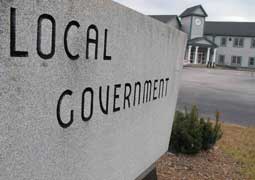
The Chairperson of the Select Committee on Cooperative Governance and Traditional Affairs, Water and Sanitation and Human Settlements, Mr China Dodovu, told the Deputy Ministers of the Department of Cooperative Governance and Traditional Affairs and the North West government’s MEC for Local Government and Human Settlements, that cooperation between the committee, national and provincial departments and the local government is the first fundamental strategic tool to make the departments and the local government meet their constitutionally required mandates.
“The support of the committee to the Department of Cooperative Governance and Traditional Affairs (CoGTA) and the municipalities is non-negotiable, we must say that one right from the beginning,” said Mr Dodovu in welcoming the Deputy Ministers, the MEC and the officials of the national and the provincial departments of Cooperative Governance and Traditional Affairs.
The Deputy Ministers of the Department of Cooperative Governance and Traditional Affairs, Mr Parks Tau and Obed Bapela, the MEC for Local Government and Human Settlements, Mr Gordon Kegakilwe, appeared before the Select Committee on Cooperative Governance and Traditional Affairs, Water and Sanitation and Human Settlements at Parliament yesterday, to brief the committee on the status of the interventions in the provinces and in the North West province.
Briefing the committee, Mr Tau stressed the importance of the provision of support to the struggling local municipalities through section 154 of the Constitution, before the invocation of section 139. According to him, the invocation of section 139 should be the last resort. “Before any step can be taken, the magnitude of the problems faced by a municipality must be established by both the national and the provincial structures of the government,” he said.
He attributed the resistance to the intervention by some of the municipalities to the hasty invocation of section 139. He said some of the North West municipalities which resist the interventions have taken the provincial government to court – and won. “If necessary steps can be taken before the intervention, there can be no unnecessary tension between these structures of government,” said Mr Tau.
Making the presentation on interventions, the head of the department, Mr Dan Mashitisho highlighted political infightings, conflict between top management and councillors, fraud and misuse of municipal funds, lack of financial systems and lack of political leadership in the municipalities.
Mr Mashitisho told the committee that some of the challenges or failures of the intervention include weak monitoring systems or inability to monitor the performance of municipalities by the provinces, no resource allocation for the implementation of the intervention, provinces usually deploy one person as an administrator instead of sending a resourceful team, resistance and obstruction tendencies from the side of municipal councillors and municipal staff that led sometimes to non-cooperation and obliteration of the information that the administrator may need from time to time.
He mentioned the lack of regulatory framework to give effect to sections 100 and 139 as contributing to a legislative vacuum.
Mr Mashitisho commended the National Council of Provinces for having played a key role in providing objectivity, mediation, and on-site investigations in the fifth parliamentary term. He said the provinces should have also played a role like this.
According to Mr Mashitisho, most provincial departments responsible for local government are ill-equipped and allocated far less budget to fulfil their mandate and as a result, they are unable to fully implement the provisions and implications of invocation of section 139 of the Constitution.
He said most of the interventions are characterised by a complete breakdown in communication between the local citizens and the municipality. “An incoming administrator needs to regain the trust of the community,” said Mr Mashitisho.
Mr Dodovu also emphasised the application of section 154 of the Constitution and section 105-108 of the Municipal Systems Act as initial tools to deal with the crisis facing municipalities.
He assured the department about the committee support and told the Deputy Ministers that the committee is going to continue visiting the struggling municipalities. “We are going to continue engaging with you and continue carrying out our oversight in a manner that improves the delivery of services to the people, which in the end the local municipalities exist for.”
By Zizipho Klaas
24 July 2019

